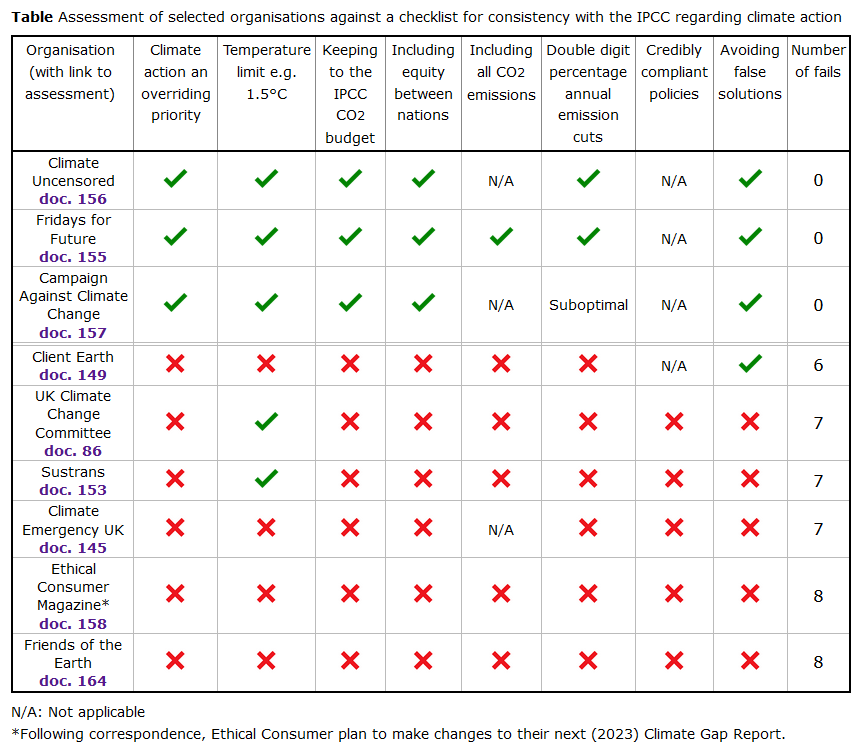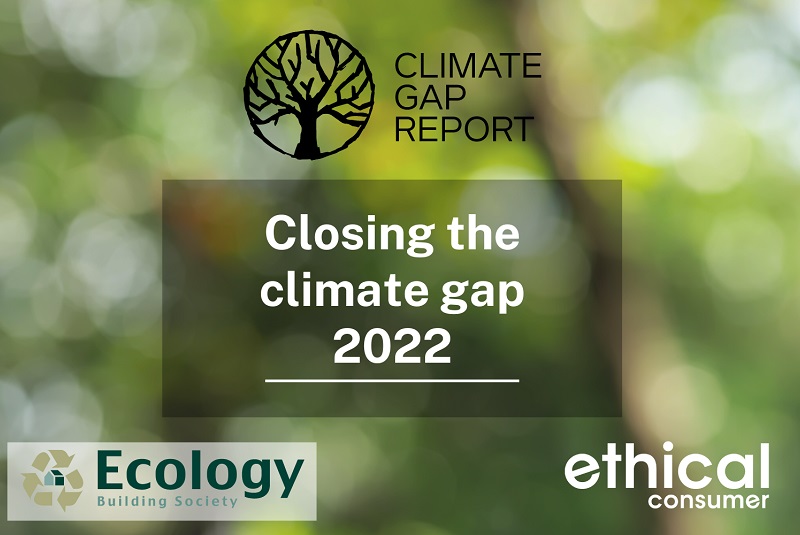
Ethical Consumer Magazine: Climate denial
Ethical Consumer magazine is a UK periodical published every 2 months.
Ethical Consumer has produced two Climate Gap reports in 2021 and in 2022 with the aim of assessing the UK's progress on climate change.
The 2022 report is assessed here by a checklist for consistency with the IPCC regarding climate action.
The findings are that the 2022 Climate Gap report is not consistent with the climate science and what the IPCC says needs to be done. The fundamental flaw is that the report compares UK action against the UK Government's timescale of emission cuts, but this timescale is not in line with the what the IPCC says needs to be done. Cuts need to be three times faster. This invalidates the whole report, which should therefore be withdrawn.
Ethical Consumer is a part of and is contributing to the widespread climate implicatory denial.
If it wants to help limit global warming to 1.5°C, Ethical Consumer should ensure that its reporting is in line with the climate science.
Update 11 Jul 2023: This assessment has been discussed with Ethical Consumer Magazine, and, as a result, changes will be made to the 2023 Climate Gap report.
Ethical Consumer has produced two Climate Gap reports in 2021 and in 2022 with the aim of assessing the UK's progress on climate change.
The 2022 report is assessed here by a checklist for consistency with the IPCC regarding climate action.
The findings are that the 2022 Climate Gap report is not consistent with the climate science and what the IPCC says needs to be done. The fundamental flaw is that the report compares UK action against the UK Government's timescale of emission cuts, but this timescale is not in line with the what the IPCC says needs to be done. Cuts need to be three times faster. This invalidates the whole report, which should therefore be withdrawn.
Ethical Consumer is a part of and is contributing to the widespread climate implicatory denial.
If it wants to help limit global warming to 1.5°C, Ethical Consumer should ensure that its reporting is in line with the climate science.
Update 11 Jul 2023: This assessment has been discussed with Ethical Consumer Magazine, and, as a result, changes will be made to the 2023 Climate Gap report.
Summary table Assessment against a checklist for consistency with the IPCC regarding climate action
| Climate action an overriding priority | Temperature limit e.g. 1.5°C | Keeping to the IPCC CO2 budget | Including equity between nations | Including all CO2 emissions | Double digit percentage annual emission cuts | Credibly compliant policies | Avoiding false solutions | Number of fails | |
|---|---|---|---|---|---|---|---|---|---|
| Ethical Consumer Magazine |  |  |  |  |  |  |  |  | 8 |

This assessment can be compared with the assessments for other groups via the summary table in document 154.
The organisation
Ethical Consumer (https://www.ethicalconsumer.org/) is "an independent, not-for-profit, co-operative with open membership, founded in 1989" [1]. It is based in the UK, and publishes a magazine every 2 months.Document assessed
 The document assessed was the Climate Gap Report 2022 [2]. It was assessed using a checklist to assess implicatory denial - see document 138.
The document assessed was the Climate Gap Report 2022 [2]. It was assessed using a checklist to assess implicatory denial - see document 138.There are concerns that climate denial in various forms is widespread throughout society [3]. Some individuals and organisations accept the basic science of climate change, and the interpretation that the climate is changing due to burning of fossil fuels by mankind - but deny or minimise the psychological, political, and moral implications of the facts, fail to accept responsibility for responding, and fail to act in the way that the information implies, which is termed implicatory denial [3].
Assessment
A summary of the assessment is given at the top of this page. Details of the checklist elements are given here.1. Is climate action an overriding priority, on the basis of e.g. the gross injustice?
NO - there is no mention of the international injustice in the report, or of other factors that make climate change an emergency.
2. Is a limit to global warming specified, generally 1.5°C?
NO - there is no specified limit to global warming - the report is stated to be "on progress towards sustainable consumer lifestyles in the UK".
3. Is there adherence to the IPCC CO2 budget? Is the mechanism for limiting global warming clearly stated to be limiting further total global CO2 emissions to the CO2 budget specified by the IPCC?
NO - there is no mention of the IPCC CO2 budget - instead, the standard used for assessing progress is by comparision with the the UK Government's Climate Change Committee reports. The introductory text in the report states:
A reminder of where we areIt is very far from the truth that the UK Climate Change Committee's timescale is in line with international agreements - it is too slow by a factor of three [4].
Our Climate Gap reports aim to annually track the gap between our current combined consumption emissions and where they need to be by 2030. ...Data for the first three [out of four] areas of our report ... are mainly taken from annual reports issued by the UK Government's own Climate Change Committee (CCC). The CCC was set up under the Climate Change Act 2008 to advise UK governments on decarbonisation, and it has a plan for reductions across the whole UK economy in line with international agreements.[our emphasis]
4. Is equity between nations incorporated? Are the implications of the international commitments to global equity properly taken into account, i.e. that developed nations cut emissions faster than the global average?
NO - there is no mention of global equity and the need to reduce UK emissions faster than the global average.
5. Are all CO2 emissions included, particularly those embodied in imports and exports and those from aviation and shipping?
NO - the report accepts the UK Climate Change Committee's policy of counting only territorial emissions, i.e. treating imports as zero carbon - see document 159.
6. Is the size of appropriate annual emission cuts specified e.g. double digit percentage cuts in developed countries?
NO - the size of emission cuts needed is not clearly stated.
7. Are any policies discussed consistent with this timescale?
NO - the policies discussed do not comply.
8. Are false solutions avoided?
NO - several false solutions are mentioned including a frequent-flyer levy, as if aviation is still affordable within the residual CO2 budget.
In summary, the Ethical Consumer report fails on all eight points on the checklist.
Comment
The findings are that the 2022 Climate Gap report from Ethical Consumer is not consistent with the climate science and what the IPCC says needs to be done. The fundamental flaw is that the report compares UK action against the UK Government's timescale of emission cuts, but this timescale is not in line with the what the IPCC says needs to be done. Cuts need to be three times faster [4]. This invalidates the whole report, which should therefore be withdrawn.Ethical Consumer is a part of and is contributing to the widespread climate implicatory denial.
If it wants to help limit global warming to 1.5°C, Ethical Consumer should ensure that its reporting is in line with the climate science.
Update 11 Jul 2023: This assessment has been discussed with Ethical Consumer Magazine, and, as a result, changes will be made to the 2023 Climate Gap report.
References
| [1] | About Ethical Consumer https://www.ethicalconsumer.org/about-us (accessed 22.2.23) |
| [2] | Climate Gap Report 2022 (Oct 2022) https://www.ethicalconsumer.org/sites/default/files/inline-files/climate-gap-2022-report_0.pdf (accessed 22.2.23) |
| [3] | Iain Walker and Zoe Leviston (2019) There are three types of climate change denier - and most of us are at least one The Conversation https://theconversation.com/there-are-three-types-of-climate-change-denier-and-most-of-us-are-at-least-one-124574 |
| [4] | https://www.carbonindependent.org/109.html |
First published: 22 Feb 2023
Last updated: 29 Jul 2023

 ✖
✖